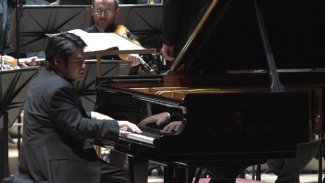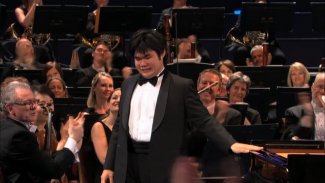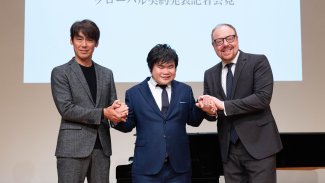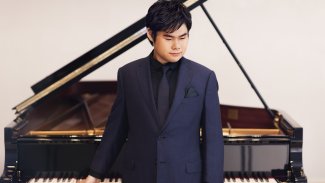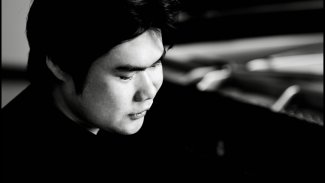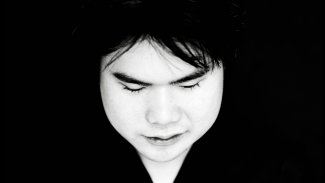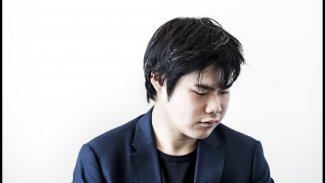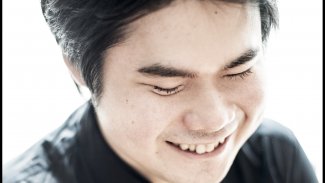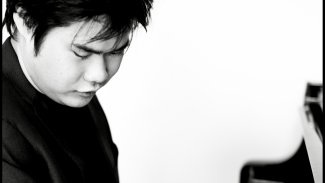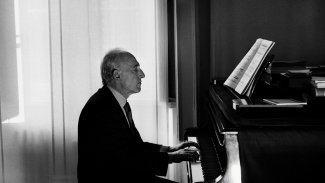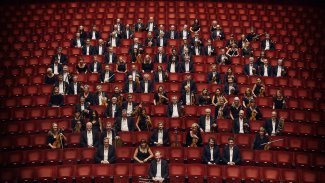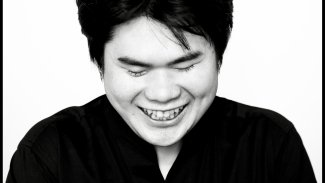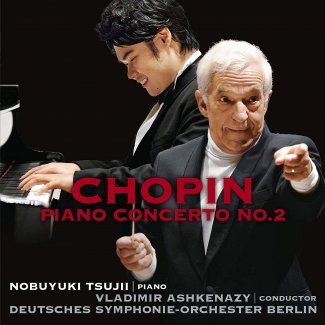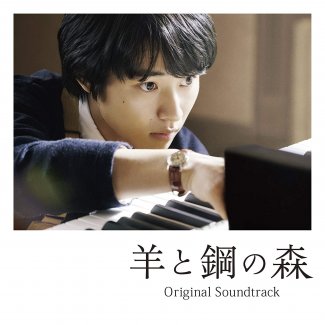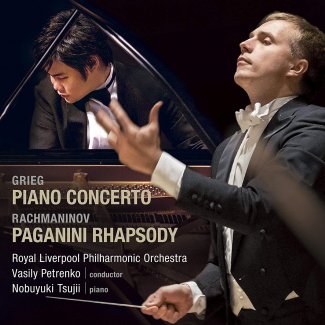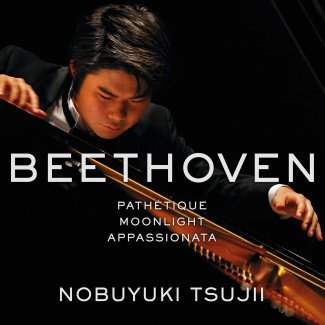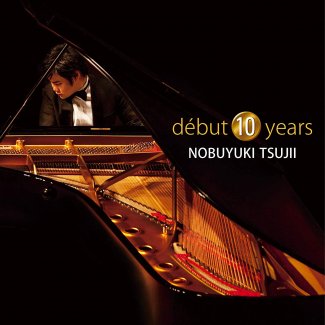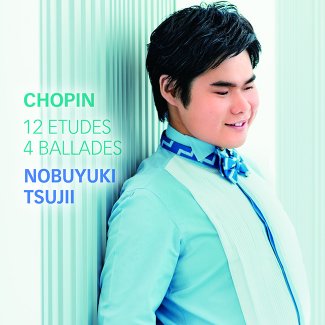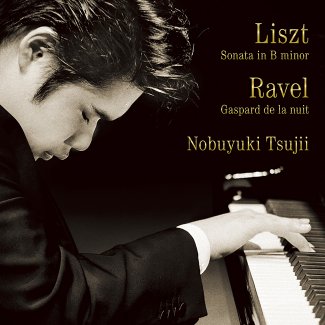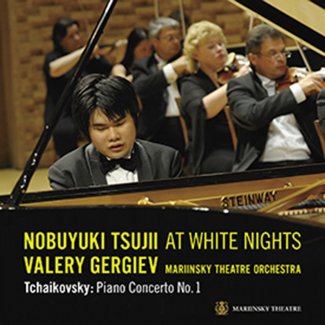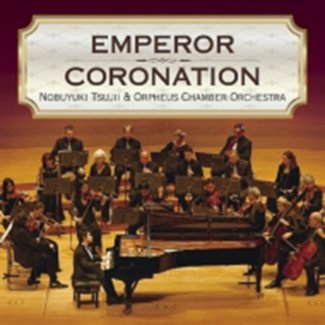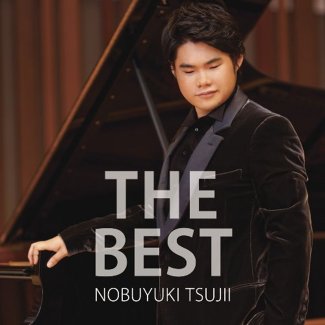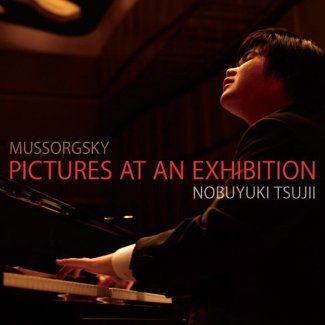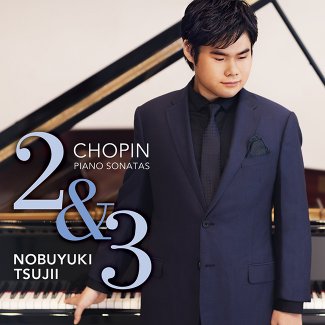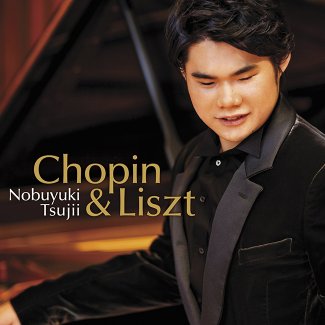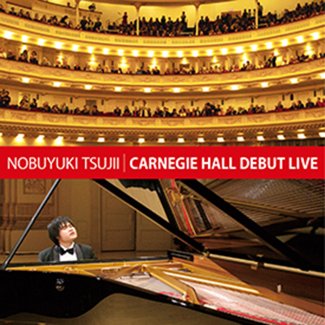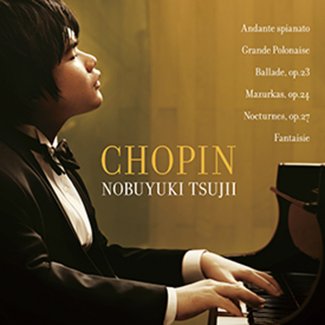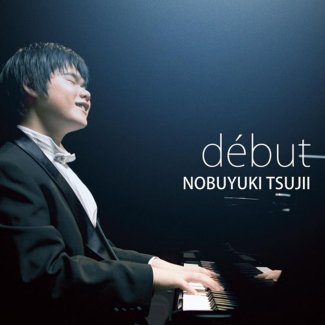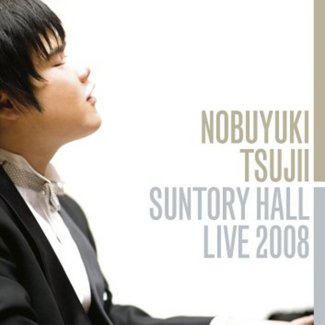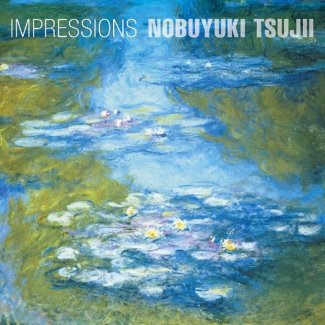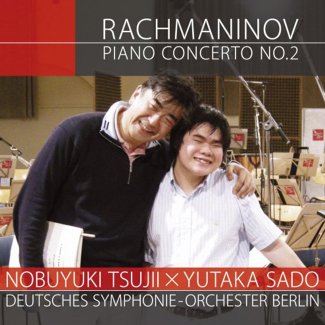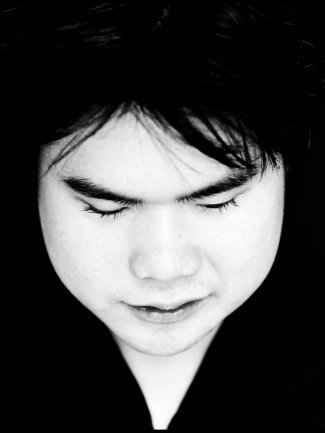
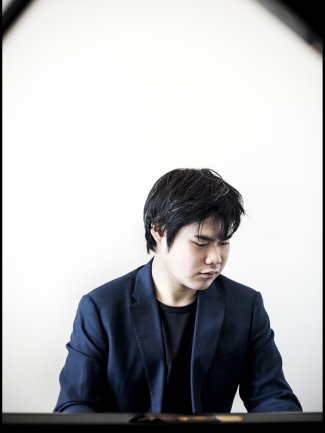
Nobuyuki Tsujii
Ariane Levy-Künstler
Nina Apollonov
Theodor Küng
“It was one of those rare performances where player and music seem one – a definition of virtuosity”
(The Observer)
Described by The Observer as the “definition of virtuosity” Japanese pianist Nobuyuki Tsujii (Nobu), who has been blind from birth, won the joint Gold Medal at the Van Cliburn International Piano Competition in 2009 and has gone on to earn an international reputation for the passion and excitement he brings to his live performances.
Nobu’s 2024/25 season opens with an extensive concert tour of Japan with Robin Ticciati and London Philharmonic Orchestra. This is closely followed by a solo appearance with the Malaysian Philharmonic Orchestra and a subsequent tour of Australia that sees Nobu appear as a concerto soloist alongside the Sydney, Queensland and Tasmanian symphony orchestras and in a recital at Melbourne Recital Centre and UKARIA Adelaide. He returns to the United States for concerts at Carnegie Hall, Civic Music Association Des Moines, La Jolla Music Society, ANA Honolulu Music Week, and as a soloist with Seattle Symphony Orchestra. European dates include concerti with Bilbao Orkestra Sinfonikoa, George Enescu Philharmonic Bucharest, Orquesta Filarmonica de Gran Canaria and Israel Philharmonic Orchestra, and recitals at London’s Southbank Centre, National Concert Hall Dublin, Interlaken Classics, and the Royal Northern College of Music in Manchester.
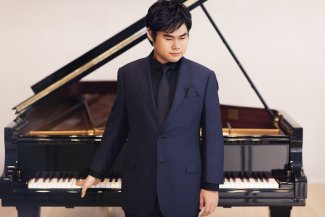
Show More
Earlier seasons have seen Nobu appear in concert with leading orchestras worldwide including Los Angeles Philharmonic at the Hollywood Bowl, Philharmonia Orchestra, NHK Symphony, Seattle and Baltimore symphony orchestras, Münchner Philharmoniker, Filarmonica della Scala, Tonkünstler-Orchester Niederösterreich at the Wiener Musikverein, Sinfonieorchester Basel, Orchestra Sinfonica di Milano Giuseppe Verdi and Hong Kong Philharmonic. He maintains a close relationship with Domingo Hindoyan and Royal Liverpool Philharmonic Orchestra, with whom he performed a sold-out concert at the Royal Albert Hall as part of the BBC Proms in 2023. Notable past collaborations also include the Philharmonisches Staatsorchester Hamburg under Kent Nagano, Oslo Philharmonic Orchestra under Klaus Mäkelä, the Mariinsky Orchestra under Valery Gergiev, the NDR Radiophilharmonie Hannover under Andrew Manze, Royal Philharmonic Orchestra under Vasily Petrenko, and BBC Philharmonic under Juanjo Mena. Nobu’s appearances as a recitalist have included performances at prestigious venues worldwide such as Carnegie Hall’s Stern Auditorium, the Théâtre des Champs-Elysées in Paris, London’s Queen Elizabeth Hall, Wigmore Hall and Royal Albert Hall, the Berlin Philharmonie, Amsterdam Concertgebouw, Liverpool Philharmonic Hall, and Singapore Esplanade.
An exclusive recording artist for Avex Classics International, Nobu’s growing album catalogue encompasses the breadth of the piano concerto repertoire. It currently includes Chopin’s Piano Concerto No.2 with Vladimir Ashkenazy and Deutsches Symphonie-Orchester Berlin, Grieg’s Piano Concerto and Rachmaninov’s Variations on a theme of Paganini under Vasily Petrenko with Royal Liverpool Philharmonic Orchestra, Rachmaninov’s Piano Concerto No.2 with Deutsches Symphonie-Orchester Berlin, Tchaikovsky’s Piano Concerto No.1 with Yutaka Sado and BBC Philharmonic, Beethoven’s Piano Concerto No.5 with Orpheus Chamber Orchestra. Nobu has also recorded several recital programmes of Chopin, Mozart, Debussy, and Liszt.
A live DVD recording of Nobu’s 2011 Carnegie Hall recital was named DVD of the Month by Gramophone, as was his latest DVD release, ‘Touching the Sound — The Improbable Journey of Nobuyuki Tsujii’, a documentary film by Peter Rosen.
Nobu’s international tours are supported by All Nippon Airways (ANA) and he gratefully acknowledges their assistance.
HarrisonParrott exclusively represents Nobu throughout the world except in Japan
Gallery
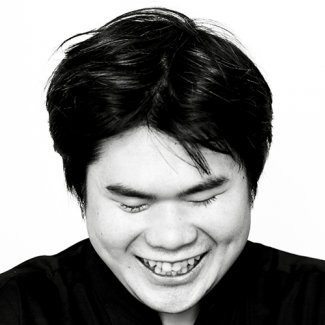
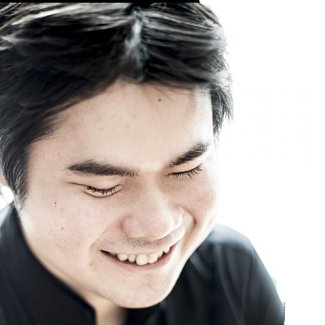
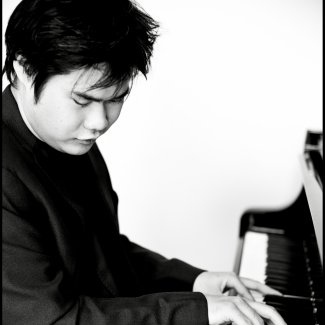
“A mainstream classical musician of superstar status” ★★★★★
“His energy seemed to galvanise the audience and I think they were more breathless than the pianist.”
“A concert performance that must surely stand as one of the most thrilling, and incredibly thoughtful, ever given anywhere. […] His technique is flawless, and his note accuracy is second to none. […] What a privilege to hear this artist play.” ★★★★★
“Nobuyuki’s Tsujii’s performance will be long remembered.”
“A combination of phenomenal technique and commitment.”
“Extraordinary” ★★★★
“The Hollywood bowl rose up in a thunderous standing ovation”
“One of the most unique classical pianists performing today.”
“Breathtaking virtuosity.”
“Tsujii’s interpretation was particularly convincing due to his brilliant musicality and a stupendous sense of style that achieved almost perfect balance and tonal transparency.”
“An extraordinary performance by any standards”
“Nobu (as he is known) gives this music a gorgeous sense of flow. In his first solo passage, his sensitivity and attention to detail were in abundant evidence. […] Nobu regaled us with sumptuous tone and shining dexterity.”
“At the heart of Nobyuki Tsujii’s pianistic art lies close listening, as distinctive beauty of sound and careful, indeed sometimes literal attention to the composer’s instructions.”
“Marine romanticism [of David Matthews’ ‘A Vision of the Sea’] was followed by the unparalleled excitement of hearing the 24-year-old Japanese pianist Nobuyuki Tsujii. … It was one of those rare performances where player and music seem one – a definition of virtuosity…it was hard not to think that being unable to see had allowed Tsujii to ‘see’ the music with unmediated intensity.”
“Nobuyuki Tsujii proved he has a sensitive ear, a light touch and the sort of technique that needs no allowances. … Tsujii was greeted with an enormous, sustained ovation – justifiably so.”
“His opening chords were spectral wisps but they swelled to a ripe fullness, after which he was off in an interpretation of notable restraint and refinement… he dominated the Adagio with easy grace, giving its lyrical lines a sweet sincerity, and avoiding all temptation to milk the music for emotional effect. His way with the Scherzo was beautifully judged, with brilliant passage-work and exuberant power. His encore – Liszt’s ‘La campanella’ – was exquisite.”
“The 24-year-old Japanese pianist, Nobuyuki Tsujii, has been blind from birth. Quite how he studies and learns the repertoire he plays, and also so effortlessly locates the keys he needs to negotiate, is to be wondered at. His opening solo of the Rachmaninov (so associated with David Lean’s film of Brief Encounter) was expectantly solemn, with no split chords, and he went on to give a sparkling, considered and very musical account, neither pushy nor dominant.”
“Tsujii took the Moderato at a fairly leisurely pace with some lovely rubato and great clarity of sound. He had a delicacy in certain passages that was very appealing. … In the adagio sostenuto, Tsujii and the orchestra never let pace drag, allowing the music and its emotion speak for itself. The apparent simplicity that Tsujii brought to the central section was quite affecting. It was difficult not to hear his phenomenal technique in the latter stages of this movement. … In the Allegro Scherzando finale, there was playing of breadth and freedom with Mena and the BBC Philharmonic showing restraint, allowing the more dynamic moments to become all the more telling. The coda, nevertheless, was scintillating. This was a memorable performance by a pianist of maturity and fine musicianship. … “As an encore, Tsujii gave the audience Liszt’s La Campanella, in a performance that was both dazzling and entertaining.”
“The Japanese Nobuyuki Tsujii, blind from birth, is already the winner of prestigious awards but I cannot have been alone in wondering how he learnt the music or how impeccable ensemble was achieved with Mena, whose back was turned to the keyboard throughout. … “Tsujii brought a singing tone and eloquent phrasing to the solo part. It was profoundly moving that the only person who could not witness his deserved standing ovation was Tsujii himself.”
“Tsujii’s method of navigating around the piano and trusting muscle memory, sound and touch made his performance all the more impressive… The middle movement was particularly beautiful and emotive, but the final movement was positively rich and sumptuous. … His performance of Liszt’s ‘La Campanella’ was a great choice as an encore: it was light and sweet, but still with the emotional edge of Tsujii’s playing. He made the trills sound so easy and performed a fantastic climax at the end of the piece.”

